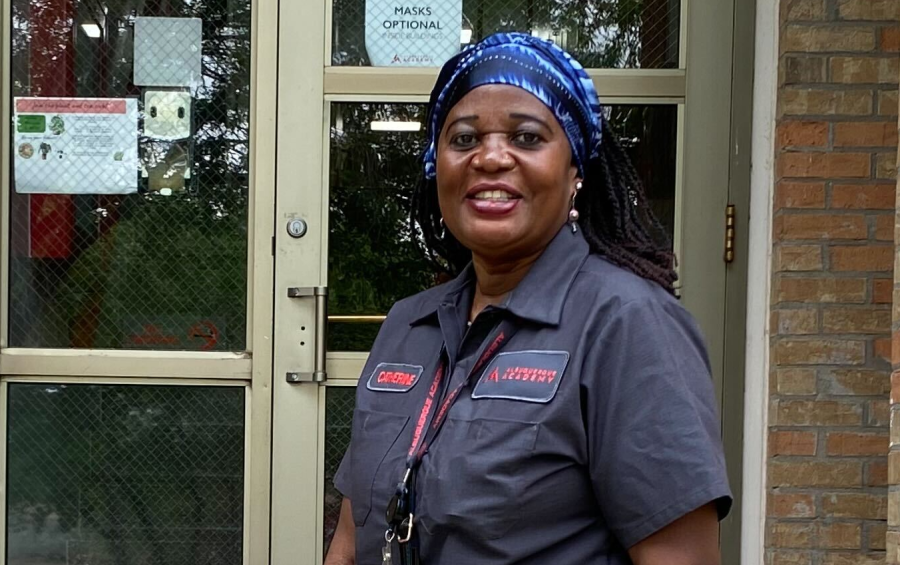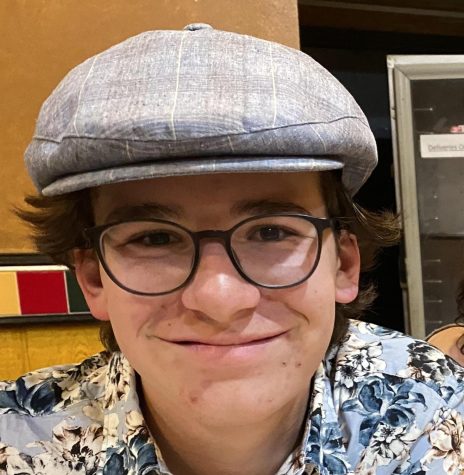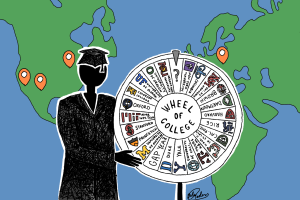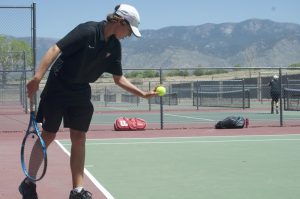Behind the Scenes
Catherine Opiss has been an essential part of our community for 10 years!
Catherine Opiss has been working at AA for 10 years after emigrating from Kenya.
May 24, 2022
Students file into McKinnon, Brown, the music building, or wherever their first class takes them each morning, thinking about their upcoming test or chatting with friends. Approaching 8:15 a.m., the halls clear and become quiet as students go to their various classes. The process repeats several times throughout the day; students crowding the halls and then peeling off to go to their next engagement, whether it be lunch, class, or the commons. But while the students are going through their school day, a new group of people arrive. This group of Albuquerque Academy staff members stay long after even the latest students leave, playing a vital, though often unseen, role in our lives.
Catherine Opiss is a member of this select group of people, the Academy’s custodial team, who arrive each weekday at 3 p.m. and leave close to midnight. I had the privilege to speak with Ms. Opiss about her work at the Academy and life in Albuquerque. Her narrative provides invaluable insight into the life of one of the Academy’s hardest workers.
Ms. Opiss immigrated to the United States twelve years ago from Kenya. With her came the three youngest of her five children, the oldest two staying behind. The process was far from straightforward. She described to me, “When you come in the right way…you have many things to process, many papers to put in….They want to know everything….So it’s a long process.” While her second-born has since emigrated from Kenya, her firstborn’s immigration process has carried on into this year.
Even after arriving in the U.S., patience was of essence. She says, “When you come in from Africa, you have to stay and wait [for a] green card. And then when I got my green card, it took a little long searching for the job.” Two years after her immigration, Opiss was able to secure the job she currently holds at the Academy, where she’s now been working for ten years. Immigration troubles and having a family split across two countries, however, followed her, as she soon realized the hard way. “I moved…and then the lawyer told me, ‘Oh my god….You spoiled everything. It will take long again to process the papers’….So you have to stay where you are working and where you are staying.”
Staying at the Academy has been difficult at times for Ms. Opiss. Currently, she helps a group of people in cleaning the dining hall and cleans the whole of upstairs McKinnon by herself. That means hallways, bathrooms, offices, and every classroom must be cleaned and organized each school day. Opiss doesn’t finish at the Academy until 11:30 p.m., meaning that she arrives home close to midnight and doesn’t sleep until one. The next morning, Ms. Opiss is a mom. She tells me, “[I] have kids. They are grown up, yes, but…I have things to do. So at home…I have to vacuum, I have to clean, and I have to prepare food before I come in [to work]. For my family.” Work begins again at three, and the process starts over again. While the work is tough, Opiss emphasizes the importance of patience. She says, “This year I have been working alone, and this building is too huge. So it was like, ‘I have just to be patient for this.’”
Some of that patience has paid off in the past years and weeks. Ms. Opiss used to work on events, preparing and cleaning up afterwards, but she has since been taken off event duty. Her shift has also been shortened by an hour since the Academy’s new schedule came into place. Similarly, her supervisor, Joshua Teague, recently hired another custodian to work on McKinnon’s downstairs. Opiss still arrives home late in the evening, but she told me her job feels less rushed now. She actively demonstrated during the interview how fast she has to work when there is no one to help with McKinnon, rushing around the classroom with purpose. For each classroom, Ms. Opiss has to wipe down the whiteboards and tables, arrange the desks when they are disorganized, and vacuum the floor if necessary. She says, “If [the classroom] is messed up a lot…it takes [a] long [time] to finish only one classroom.”
Opiss’ position is improving in other ways too. Often, the groups she works with are made up of primarily Spanish-speaking individuals. Opiss says, “[My colleagues] don’t understand English, but those who understand a little bit, we talk…[The] language barrier is a problem. Sometimes you can tell somebody nice things, and…because of language, it brings you problems….So sometimes I just keep quiet because I don’t know what they are talking about until I have someone to translate for me.” That same new person that came to help Ms. Opiss in McKinnon speaks English and has provided not only physical but linguistic respite for her. When I asked Opiss whether it was nice having someone she can talk with in her building, she gave me an unequivocal “yes.” Opiss elaborates, “She’s very happy. She’s talkative, and she likes some stories and says, ‘Catherine, tell me about Africa.’ ”
Incidentally, at this point in the interview, our conversation turned back to Opiss’ experiences in the U.S. and Kenya. She says the biggest reason she left Kenya with her children was to seek greater opportunities. She says, “In Africa, we have jobs, but [there are] few jobs. Many people went to…college, but they are still struggling….Opportunity [for] jobs is just low.” She added, however, that other aspects of life in Kenya were better.
When I asked Ms. Opiss whether she was happy living in the U.S. or perhaps disappointed, she listed several things she was happy about, like living in Albuquerque, but she didn’t directly say at any point that she particularly liked living in the U.S., preferring to refer to it as “different.” Her reasons for this sentiment align well with what I feel are the United States’ least attractive traits. Opiss describes this, “Here you can’t just meet people, even your neighbor…But in Africa…they gather together, no worries.” In Africa, she says, there is a much greater focus on community. Ms. Opiss also delved into her worries about drugs, pointing to a Congolese family she knew whose kids were exploring drugs. She told me about her worries about kids growing up with unhealthy and dangerous habits, which was not as much if at all a concern in Africa.
Ms. Opiss also spoke of her worries around gun violence and firearms in the U.S. She says, “I am scared when I hear somebody [came] with a gun and shoot the students. I feel pain [for] that. In Africa there is control…[Here,] sometimes I’m scared. Even when I go [to the] mall to buy something, I go very fast because I hear sometimes it happens anywhere.” In the end, Opiss drew the conversation back around to her happiness in her job and living in the U.S. Her candid description of the positives and negatives with living in America were eye-opening for me. Immigrants are perhaps the best equipped to honestly tell their opinions on the United States because they have no partiality. They left their home country for whatever reason, but they are often not immediately enamored with the U.S.
Ultimately, Ms. Opiss gave the impression that she is generally happy living in Albuquerque and working at the Academy. When I asked her whether her interactions with kids and staff were positive or negative, she lauded the Academy’s students and faculty with praise, somewhat to my surprise. She told me, “I always love kids. I love them all, whether they don’t say hi, I’m okay. But many of them are happy. They [say], ‘Hi; how are you doing today?’ Sometimes they say, ‘You have nice earrings,’ and this and this…Since I have been here, I haven’t seen a bad kid.” Ms. Opiss gave the faculty similar praise when asked about them. She approached me after our formal interview to make sure I emphasized her appreciation of the teachers who work and have worked in McKinnon, saying they are like family to her.
I urge students to continue this theme of giving respect and graciousness to the school’s custodians. Like Opiss, they are dedicated and friendly people, and they play a big role in our everyday lives, even if it’s something often taken for granted. Opiss’ account is a singular example of the Academy’s diverse faculty and their intricate stories. Opiss by no means has an easy or worry-free life, but she is happy nonetheless. That kind of perseverance and optimism is respectable on its own. Opiss has come a long way in her life, literally and figuratively, and I’d say a simple “Hello,” or compliment is the least we could do for her and the other custodians who put in long, important hours of effort behind the scenes.









Liz Payne • Aug 26, 2022 at 2:55 pm
Really lovely. Thank you for writing this, Mr. Eberhardt. And, of course, a huge thanks to Catherine for the incredible work she does in support of our division.
Anais Garvanian • May 27, 2022 at 11:28 am
Thank you for this informative and thoughtful interview with our colleague! I was glad to learn more about her and her story. I will make sure to introduce myself and say hello. Another story well done, Darin.
Rebecca Marianetti • May 24, 2022 at 10:09 am
This was lovely! Thank you so much for profiling such an important community member!